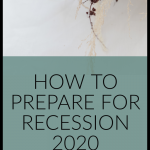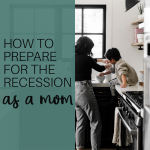The next recession is coming. Will you be ready? Find out how to prepare for the recession so you can provide for your family no matter what comes your way.
The glorious blue sky and sunshine out my window seem to be in stark contrast with today’s news.
- The stockmarket…plummeting
- Restaurants…empty or forced to close
- Those than can are working from home, but those that can’t…well, you know
All in all, it’s no surprise that economists are calling a recession likely, and others say we may already be in one.
And all I can think about is how this will affect YOU—the families represented here in the Affording Motherhood community.
I was so preoccupied as I sat down to write this that I realized that I’d left my groceries in the back of the car. 🤦
You see, the Great Recession was not kind to my husband and me
We experienced reduced hours at work for months.
Then, just days before we found out I was pregnant with our first baby, we discovered that my husband’s paychecks would be late—very late.
As you may know, we ended up losing our home to a short sale in those years.
So even if the consumer panic related to this new epidemic is over the top, the potential effects on your family’s finances are very real.
Recessions since WWII have happened on average every 6 to 7 years, so we’re well overdue.
Whether the next recession was to be triggered by the Coronavirus, or some other event, there is one thing you can know for sure.
The next recession is coming.
And you need to be ready.
Now, there’s no reason to panic.
Instead, do the opposite of what everyone else is doing
Prepare.
Let me be blunt.
Whatever the negative mental loop that’s running circles around your brain is saying:
- “I’ve tried and failed so many times.”
- “My budget is too tight; I don’t know how I’m supposed to save for the future.”
- “I feel stuck. It seems like we’re always trying to pay off debt, but we never get there.”
No more excuses.
Get your Mama Bear on and stand up and fight for your family.
Your children need you to be ready to provide whether Daddy can’t go to work or you have huge medical bills or something else hits your finances hard.
Believe me, wondering where you’re going to tuck in your baby at night is no fun.
How to Prepare for the Recession as a Mom
So, what can you do now?
- Commit to no new debt
- SAVE, SAVE, SAVE!
Notice what’s missing from that list?
psst…It’s paying off debt

I know it’s going to sound crazy coming from me. But when a recession is as imminent as this one, it’s not the time to pay extra on your debt.
This is the same advice I would give for one of my Budget Breakthrough students who was going through a health crisis or expecting a new baby.
Right now, we are all in a health and economic state of emergency, and your savings may prove crucial in the near future.
This isn’t the time to try to pay extra on your debt.
You should, however, commit to no new debt
Debt is never a great idea, but this isn’t the time to increase your debt in any way. You don’t need to be responsible for new monthly payments when everyone’s income is uncertain right now.
If you’ve been planning a big purchase like a car or house, you should probably delay it for now. And whatever you do don’t use those credit cards.
Aim to Save 1 Month’s Income in the next 3 months
JPMorgan predicts that the recession will be in full swing come July. That gives you just about 3 months to save up as much as possible.
Building a one-month emergency fund is what I always recommend my Budget Breakthrough students start with anyway. Most of them what to argue with me and tell me it’s impossible—until they come back and achieve it much faster than they thought.
Because that’s the thing about impossible goals.
Once you set that goal, you will find ways to achieve it.
But it’s easier if you break it down into smaller steps. So, aim to save at least $1000 in the next 30 days.
But then, keep on saving
If you’re like most Americans, and many of the families in this community, you have less than a month’s income stashed away for emergencies. That’s ok, you have to start somewhere.
In fact, you have to start right where you are. And then move forward.
It’s go time, so keep saving as much as possible until the economy regains its stability.
How do you do that?
Get ready to take action.
I know how hard it is to focus when your news feed is blowing up with new infection rates, school closures, or worse.
So let’s walk through some simple, actionable tips to help you move forward.
1. Bank whatever you save from staying at home
If your morning was anything like mine, it consisted of phone calls and texts telling you everything was canceled and drawing lots of lines through the items on your planner.
I figure I’ll save around $100 in the next month on gas from not having to drive the kids to school and appointments.
If my husband ends up having to work from home, we’d save at least another $100.
Although this probably isn’t the situation any of us would choose, you can reap the benefits of social distancing for your budget.
For the average family, gas alone is $248 a month. (Source: Bureau of Labor Statistics)
You’ll have more time to cook at home, and restaurants are closing down anyway. Save whatever you’d usually spend eating out. For the average family of four, that’s $397 per month.
Likewise, movie theaters, concerts, conferences, and travel are all no, nos right now, so your entertainment costs may also go down, $115 per month on average.
So all together that’s…
- Gas $248
- Dining Out $397
- Entertainment $115
For a total of $760 per month
By many estimates, social distancing could become the norm for at least several months.
At least there’s one advantage of the circumstances. Capture these savings while you can.
Over the course of 6 months, that could be a $4,560 added to your emergency fund.
Take the time right now to assess how much you could save in these and other areas of your budget.
Go ahead, I’ll wait.
Next Step Resource: 77+ Easy Ways to Save Money
2. Hang onto your tax refund
The average tax refund right now is $3,012, according to the IRS filing stats. If you received a refund, that puts you well on your way to the one-month savings goal alone.
As I’ve already written about, it’s not a good idea for most families to use their refund to pay off debt anyway. This is especially true now.
The tax filing deadline has officially been extended to July 15. However, you should still get yours filed as soon as possible to get your refund in your pocket. (Source: IRS.gov)
Next Step Resource: When you shouldn’t pay off debt with your tax refund?
3. Pocket any benefits you receive from the stimulus
We may not know the full extent of the government stimulus bills for a while.
Whatever they may be, if they do trickle down to your personal budget, save that money.
For instance, if your student loan payments are waived or go down because of waived interest, set up an automatic transfer into your savings account for the difference.
Whatever money the government sends you, save it.
In the 2008 stimulus, married couples got $1,200, so this could be a significant cash infusion for your family. In the first round stimulus it will be $3,400 for a family of four.
Yes, I know it’s better for the economy if you spend it, but it’s better for your economy if you can pay your bills if you lose your income.
4. If you find yourself with extra time at home, make budgeting a project

Right now, there is so much unknown. It’s easy to become numbed by anxiety as you grip your phone for updates.
The best thing to do in times like these?
Do one thing you can control.
Pry that smart phone out of your grip, stop scrolling social media or reading the latest news, and learn to budget—the right way.
That way, you’ll be ready to maximize whatever blessings come your way, even in the midst of crisis.
And when we come out of this crisis—and we will—you’ll get to enjoy a lifetime of healthy, stress-free finances.
Next Step Resource: 6 Budget Myths that Keep You Stuck (and what to do instead)
Put it all together, and what do’ya get?
With the small changes to our circumstances, you may be able to quickly build a one-month emergency fund:
- $760 per month savings by staying at home (Over 6 months that’s $4,560)
- $3,012 tax refund
- $3,000 potential stimulus check

Along with getting your finances in order and learning to budget, you’ll set your family on a firm financial foundation.
*****
Sometimes it takes the worst circumstances to bring what’s really important into sharp focus (and no, I don’t mean toilet paper).
Although the stress of the last recession was crushing, I wouldn’t change it. Those struggles were the catalyst for me learning how crucial it is to save for emergencies and live a debt free lifestyle.
It forced us to learn the right way to budget.
So now, we’re going into this much more prepared.
This is your moment.
You’ve got this, Mama.
Of course, the key to capturing the savings we’ve discussed is sticking to a budget and not adding to your debt.
And that can be tough.
But you don’t have to go it alone
What if you really have tried to budget and build an emergency fund in the past, but it never works out?
The struggle is real.
But the good news is, you can finally overcome these obstacles, once and for all.
And I would love to walk alongside you, as I do for moms every day in the Budget Breakthrough program.
Though we’re all feeling a little isolated right now, you can be supported in this high-touch coaching program as you protect and provide for your family in this storm.
Learn more about the Budget Breakthrough Program now
And the sooner you take action, the better you and your family will be able to weather the recession.




